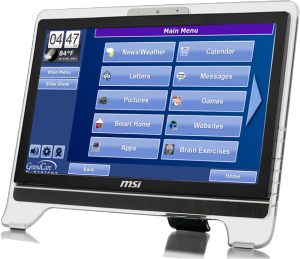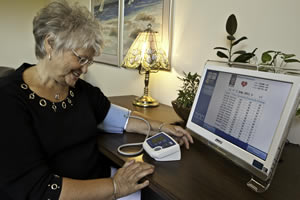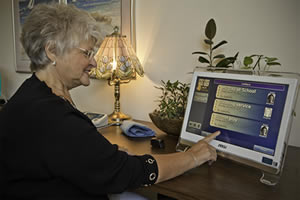“The GrandCare technology is result driven; a proactive versus reactive care solution” – Stacey Pierce, Director of LIVE@HOME Technologies
Testimonial from Stacey Pierce, Director of LIVE@HOME Technologies:
LIVE@HOME Technologies understands the new frontier of in-home care through technology, using both low and high tech technology to meet the needs of our clients. We use everything from telephone check ins, Personal Emergency Response Units and Remote Telehealth & Activity of Daily Living Monitoring Systems such as GrandCare Systems. The GrandCare technology is result driven; a “proactive versus reactive care solution”. As one example, Mr. C has had many heart surgeries, Congestive Heart Failure, and Diabetes. We have worked with his doctors to set wellness parameters and goals to prevent a future “event”. This type of awareness and proactive care can mitigate hospital stays and detect potential symptoms before it becomes life-threatening. Using GrandCare technology, we have kept Mr. C in his home for two years now, saving him and his family, roughly $112,000.
In home care can be very expensive and many simply cannot afford or do not need 24 hours of hands-on care. We utilize technology, such as GrandCare Systems, to work in conjunction with professional caregiving staff. Live@Home Technologies has placed GrandCare technology in many homes, not only as a cost- effective way to stay at home, but also to assess if and when additional care might be warranted.
Live@Home Technologies has also designed programs to save money for Long Term Care Facilities as well as their residents. The average cost of Independent Living at The Oaks, a CCRC in South Carolina, is $2,000.00 per month and goes up to $3,5000.00 for Assisted Living. Live@Home Technologies implemented a new “Monitoring Independent Area of Living” program at the Oaks by using GrandCare motion, door and bed sensor technology to monitor several residents at once. This concept allows the Oaks to reduce unnecessary footsteps and save money by making fewer caregivers more efficient and effective. Each resident has seen a cost savings of $1200.00 per month, that’s almost $15,000.00 per year.
Through the setting of individual rules, we monitor activities such as wandering, being out of bed, leaving apartments in middle of night, not accessing medications, or too much motion in bathroom; all of which have been directly related to UTIs, medications not being taken properly and increased Sundowners. Using the GrandCare technology, we assess each individual’s ADLs, allowing us to be proactive and respond to any notable changes in daily life. Although, technology does not replace care giving and human touch, it can be a helpful tool to gain information on a possible event, save health care costs and give an added peace of mind, while staying at home.
We eagerly anticipate the many exciting ways we can take advantage of the advances in technology to provide top-notch in-home care that meets the demands of our caregiving staff, our residents and their family members.
-Stacey Pierce
Director of LIVE@HOME Technologies
About LIVE@HOME Technologies
The Methodist Oaks has more than 50 years of experience of mission and ministry with seniors giving care and services at our Faith Based Continuing Care Retirement Community (www.theoakssc.com). In the last few years, recognizing the need to expand our care giving to a greater community, the Board of The Oaks made the decision to offer our expertise in the integration of Care and Technology throughout South Carolina and portions of North Carolina and Georgia.
The Oaks created LIVE@HOME Technologies to offer the latest in rapidly changing technological advances to assist people in staying at home. LIVE@HOME Technologies constantly researches and test various technologies which are available and utilizes that which best suits the client’s situation. LIVE@HOME Technologies learned early on that the most critical step of helping people stay at home rather than moving to an Assisted Living or other living option is the evaluation of the needs and desires of the potential client and the family.

 “PREDICTION – mHEALTH REVIVES MONITORING: The stationary nature of in-home activity and telehealth monitoring will give way to a disconnect-and-go tablet world that can be docked at home and plays nicely with a cell/smart cellular model. For those walking the floors at CES, you will see tablet apps of every type flowering hither and yon – perhaps you’ll see them tether to a phone. RIM, the anti-marketer, produced an early version of this with the Playbook-BlackBerry tethering. Why not a few tablet apps for seniors (in addition to health and activity monitoring) that sync up with a phone-like device? It may be like trying to cram a large box into a flat rectangle, to start at the hardware end — look at Care Innovations Guide, for example. Why not a partnership between a fitness device vendor (like Fitbit or Philips DirectLife) and a remote monitoring vendor like BeClose or Healthsense? And software-only products like Independa and GrandCare may well benefit from both platform flexibility and a new interest in combining activity sensors and health monitoring.”
“PREDICTION – mHEALTH REVIVES MONITORING: The stationary nature of in-home activity and telehealth monitoring will give way to a disconnect-and-go tablet world that can be docked at home and plays nicely with a cell/smart cellular model. For those walking the floors at CES, you will see tablet apps of every type flowering hither and yon – perhaps you’ll see them tether to a phone. RIM, the anti-marketer, produced an early version of this with the Playbook-BlackBerry tethering. Why not a few tablet apps for seniors (in addition to health and activity monitoring) that sync up with a phone-like device? It may be like trying to cram a large box into a flat rectangle, to start at the hardware end — look at Care Innovations Guide, for example. Why not a partnership between a fitness device vendor (like Fitbit or Philips DirectLife) and a remote monitoring vendor like BeClose or Healthsense? And software-only products like Independa and GrandCare may well benefit from both platform flexibility and a new interest in combining activity sensors and health monitoring.”


 The GrandCare system was the first system to combine socialization, activities of daily living (ADLs) and telehealth monitoring, which together provide peace of mind for family members living close by or long distance. With “wireless” Bluetooth, X10 and ZWave sensors throughout the home, family and caregivers can monitor the senior’s health and home. No computer skills are needed to operate the easy to use senior home care solution that features an interactive touch screen. Designated caregivers and family can log into the GrandCare website and access sensor graphs, vitals and set up parameters/rules to receive alerts if specific events occur such as medications are not taken, a door is opened at odd times, a refrigerator is not accessed at meal time or an individual did not get out of bed.
The GrandCare system was the first system to combine socialization, activities of daily living (ADLs) and telehealth monitoring, which together provide peace of mind for family members living close by or long distance. With “wireless” Bluetooth, X10 and ZWave sensors throughout the home, family and caregivers can monitor the senior’s health and home. No computer skills are needed to operate the easy to use senior home care solution that features an interactive touch screen. Designated caregivers and family can log into the GrandCare website and access sensor graphs, vitals and set up parameters/rules to receive alerts if specific events occur such as medications are not taken, a door is opened at odd times, a refrigerator is not accessed at meal time or an individual did not get out of bed.

 by Laura Mitchell, VP Marketing, GrandCare Systems
by Laura Mitchell, VP Marketing, GrandCare Systems

